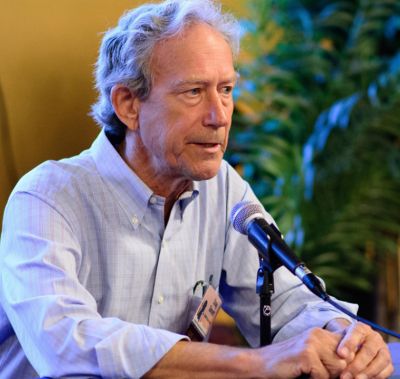Craig Garnett, publisher of the Uvalde Leader-News, wins 2023 Tom and Pat Gish Award for courage, integrity and tenacity in rural journalism
Sep 1, 2023

Craig Garnett, publisher of the Uvalde Leader-News in southwest Texas, is the winner of the 2023 Tom and Pat Gish Award presented by the Institute for Rural Journalism and Community Issues at the University of Kentucky.
Garnett owns the twice-weekly newspaper that continues to cover, and contend with, the aftermath of the May 2022 school shooting in which 19 children and two teachers died.
“The award recognizes not only Craig’s courageous coverage and commentary about the tragedy, but his longtime willingness to tell hard truths about things that matter in Uvalde County,” said Al Cross, director of the Institute and extension professor of journalism.
The award is named for the couple who published The Mountain Eagle in Whitesburg, Kentucky, for more than 50 years. Their son and successor, Ben Gish, is on the award selection committee. He said of Garnett and the Leader-News, “It’s one thing to read national news accounts about law enforcement not moving quickly enough to save the lives of many of the victims, but it’s entirely something else to read the local newspaper’s far deeper accounts of that continuing controversy. ... The Leader-News does not hesitate when it comes to letting family members of the victims have their say, nor does it shy away from printing the responses of those whose actions, or lack thereof, are being questioned.”
In a column shortly after the shooting, Garnett wrote that a regional police official "could not answer why it took an hour to end the attack" and quoted him: "It is a complex situation. They are measuring; they are measuring." He wrote, "The question is how much measuring is permissible, while children are being murdered. Or perhaps they were already gone. It pains to write these words of criticism about law enforcement, but parents and the community have the right to know. They must be told why police, whom parents at the scene begged to go in and save their children, failed to act. They have to know to ever begin to heal."
He concluded, "There is a final question that no one will ever adequately answer. It came on Thursday in the form of a text message from our reporter, Kimberly Rubio, whose fourth-grader Lexi did not come home that day: 'Why would someone hurt my baby, Craig?'"
Rubio, now in the newspaper’s advertising department, praised Garnett for the paper’s family atmosphere and encouraging environment: “He is gifted in seeing a person’s potential. He is a teacher, able to guide us as we harness that potential. He believes in us, and we learn to believe in ourselves. I have the same faith in him and his writing staff.”
Garnett spent hours “sitting with families who lost children, siblings and friends; interviewing survivors, teachers and students, about their experience,” Leader-News Managing Editor Meghann Garcia said in nominating him. She said he has made a “dogged pursuit to learn how so many things went wrong that day — how every single fail-safe failed. ... He has done all of this without a break from the office, from the work.”
In an editorial a month after the shooting, Garnett named names and was blunt: “No mass school shooting in the United States has ended with such glaring failures in both the law enforcement response and school district security. ... Neither [school] Police Chief Pete Arredondo, acting city chief Mariano Pargas, Uvalde County Sheriff Ruben Nolasco nor any state or federal officer among the 376 responders to the scene was willing to take the helm of what was clearly a rudderless ship cast into a hurricane.”
A week later, another Garnett piece endorsing more gun control concluded: “I am not about to surrender my guns, and they are many, but I challenge you to give me one good reason (and please, not the “slippery slope” argument that did not come to pass when assault weapons were banned) why a teenager should have the firepower to stand down 376 lawmen. If disturbed young men are going to commit horrific crimes with firearms, why not take the most devastating amplifier out of the mass shooting equation?”
Criticism of local law enforcement and support for more gun control didn’t sit well with some people in the town of 15,000 and county of 25,000. Garnett said at a meeting of the newspaper association in Oklahoma, his native state, that by the end of the day of the shooting, “The school and police agencies that the newspaper had a good relationship with all clammed up. A year later we still can’t get answers. We have filed about 10 to 15 requests with the school district and still can’t get any answers.”
Garcia began her nomination of Garnett with the story of a call from a reader who objected to a picture of “a local pediatrician, outspoken in the shooting aftermath, at the White House, in a commanding photo with President Joe Biden and Vice President Kamala Harris.” The caller said Garnett had “better not acknowledge Biden's presidency again if he wanted to keep the caller's subscription,” Garcia wrote. “The call was mild compared to what the newspaper staff had fielded over previous weeks. ... Craig immediately turned to his typewriter to work on a subscription refund check and your-wish-is-now-granted letter.”
Garcia continued, “It wasn't the first time our coverage, or Craig's politics, went against the grain.” Garnett had editorialized against the Iraq War and opposed “a water pipeline that would take local water, dearly needed for agriculture, a mainstay of the area economy, and funnel it to San Antonio,” she wrote. And four years before the shooting, he opposed the idea of a separate school police force, which botched the response to the shooting. The next year, the paper published a guest-written series of stories about the local Ku Klux Klan chapter of 100 years before.
“Craig has never been afraid of taking a stand or telling the news, despite how unpopular it might be with subscribers and advertisers, who are also often his friends,” Garcia wrote. And he has used his own family’s troubling experience as an example to give hope to others.
His wife, Melissa Garnett, told the Gish Award selection committee, “One of his best columns was about our son’s process of recovery from drugs and alcohol. That took courage. He must have hit all the right notes, as the response was great — he had taken the bold step of using his pain of an addicted child to remove the stigma of talking about addiction.”
The column celebrated their son’s year-plus of sobriety and concluded, “Far too many addicts today, especially those in thrall to opioids, don’t get Logan’s chance at recovery. The steps that will lead them from a world of pain and failure remain stubbornly distant and daily receding until hope is lost. We should do all we can to help them discover a path, because inside every addict lives someone’s treasured child, father, husband, brother or friend.”
Garnett “and his paper have been a continuing source of strength in that community and beyond,” said selection committee member Bill Bishop, founding editor of The Daily Yonder, a national rural-news publication, a former weekly editor in Bastrop, Texas, and columnist for the Austin American-Statesman.
Garnett, who earned an economics degree from Southern Methodist University, joined the Fort Worth Star-Telegram in 1977, moved to the Kansas City Star in 1978, became general manager of the Leader-News in 1982, and owner and publisher in 1989. Under his ownership, the newspaper has won many awards.
“I am extremely honored to receive the Gish Award,” Garnett said. “And I am deeply humbled by the support from coworkers and friends in the industry who thought my work worthy of such recognition.”
The Institute for Rural Journalism will present the Gish Award to Garnett in Texas at a time and place to be determined. He will be recognized Oct. 26 in Lexington, Kentucky, at the Institute’s annual Al Smith Awards Dinner, with USA Today Washington Bureau Chief Susan Page as the keynote speaker. At that event, Ben Gish and Mountain Eagle reporter Sam Adams will receive the Al Smith Award for public service through community journalism by Kentuckians.
The Institute for Rural Journalism and Community Issues exists to sustain rural journalism and help rural journalists define the public agenda in their communities. It is part of the School of Journalism and Media in the College of Communication and Information at the University of Kentucky.










